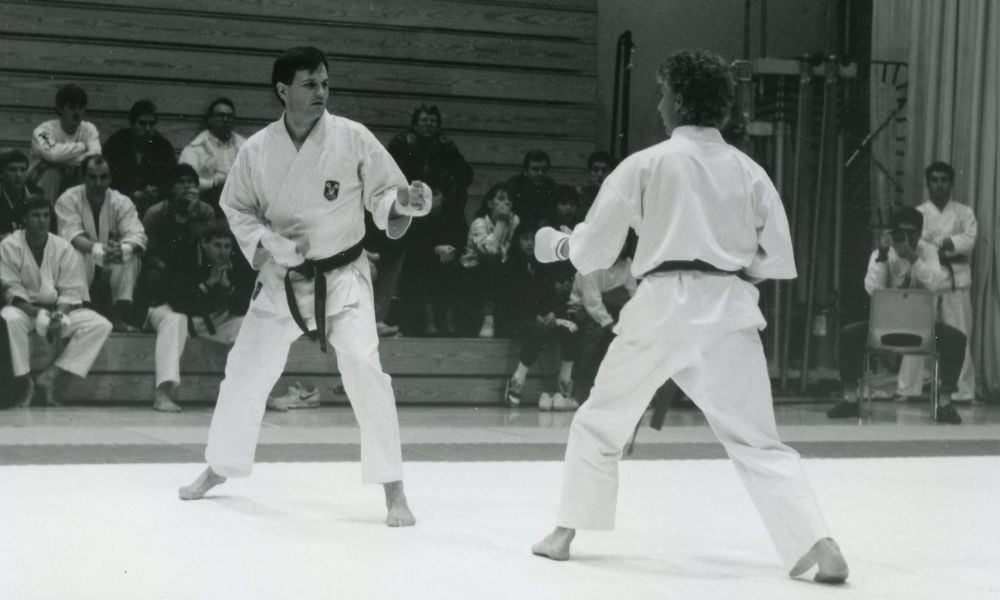Stacey is a seventh-degree blackbelt

Mark Stacey recently told some of his students at East Vancouver’s Odokan Shito-ryu Karate-do that they do not “hope” or “try” to do anything in his dojo. He does not want to hear that they will try to come to practice or hope to make it to the competition. They either do it or don’t.
He says it is simpler not to have a choice in a matter. If a person chooses to go to practice or a lawyer chooses to complete a task, an opening remains for them not to. “If you just say you're going to do it, and you do it, it's a much easier way to live.”
“I'm not so different in terms of how I run my practice teams.”
Stacey is the co-managing partner and co-chair of the commercial litigation group at Singleton Urquhart Reynolds Vogel. He has been practising law for 40 years but has been practising Shito-ryu Karate for longer.
At age 19, he studied under Grand Master Seiko Suzuki in Tokyo. After attending Osgoode Hall Law School, he competed in the Pan American Karate Championships and the World Karate Federation Championships with the Canadian National Karate Team. He opened Odokan Shito-ryu Karate-do with fellow Suzuki alum Kaz Hashimoto. They have been training young Karate-do practitioners for 35 years, many of whom – like Stacey – have competed at the sport’s highest levels.
In 2018, Stacey earned a seventh-degree black belt while training with Suzuki in Tokyo. Having returned there again this February, he was awarded the ranking of Shihan-dai, which can be interpreted as assistant master, assistant instructor, or assistant professor.
After nearly 50 years of training in Karate, Stacey said it has been “the most powerful single influence” in his life.
“We teach a lot of children, and parents who bring their kids to our dojo say, ‘You know what? My kids a lot calmer since they've been here.’” He says: “That's not a surprise to me. That's what I would expect.”
“These days, you find a lot of people bringing their children to karate training because they want a structure that teaches them some discipline, some dignity, some respect, and manners. A lot of parents are concerned their children don't necessarily get that when they go to school. We have a very strict training environment that most kids – not all, but most kids – really enjoy.”
While in Japan, Stacey has also spent some time in Zen Buddhist temples, and monks have told him that Karate, called “Moving Zen,” has its roots in the religion. Unlike in mixed martial arts, of which it forms a part, Karate is scored based on techniques that do not injure the opponent but that are delivered with precision and control, he says.
In most traditional Karate, the movements begin with a block. The approach is always to block, then counter. The practitioner is not supposed to be on the offensive. It is, fundamentally, about defence.
The philosophy and skills Stacey has learned in the dojo have also helped him become a successful lawyer.
“You’ll find this among a lot of lawyers who come from high-performance sport backgrounds,” says Stacey. “It's not that big a transition to go from being a very dedicated, hardworking athlete to becoming a very dedicated, hardworking lawyer.”
He says Karate’s focus on control and discipline produces transferable courtroom skills.
“A lot of times, you are making a submission in court, and the particular judge or master you're talking to is not very receptive to what you have to say. It's important to be able to be disciplined about how you're dealing with that.”
Lawyers must deliver arguments forcefully, respectfully, and without losing sight of their case's broader issues and limitations. Stacey says that some lawyers get angry, upset, and flustered, but that does not help.
He adds that anyone doing commercial work has dealt with self-represented litigants and the challenges they present the litigation. Their growing presence is partly responsible for the diminishing respect and decorum in the courtroom. While it can be an aggravating experience to deal with a litigant who is not a trained lawyer and who says things which are inaccurate, irrelevant, or inappropriate, lawyers cannot respond with demeaning or distasteful conduct. “In my experience, judges don’t like that,” he says.
“Oddly enough, martial arts training does help you in the sense that you become a lot more measured in terms of how you deal with things. Hostility doesn't unnerve me.”










